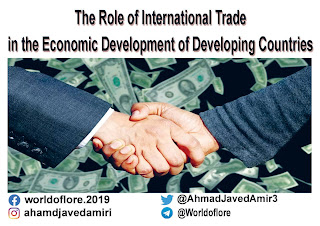The Role of International
Trade in the Economic Development of Developing Countries
The Living Legend
Ahmad Javed Kamran Amiri
Dated: Thursday 21st
November 2019
Although today's
business cannot be regarded as an engine of economic growth and development, it
can still contribute greatly to growth in developing countries in a variety of ways
(in addition to the benefits of comparative advantage).
Haberler is one of those who points to the important impacts of international
trade on economic growth and development: Trade can and does make full use of
domestic idle resources. In other words, through trade, a developing country
can reach a point on the production facility curve from an inefficient
production point within the production facility curve despite lack of full
utilization of resources due to insufficient domestic demand.
For such a
country, trade is either a surplus drainage or a sales market for agricultural
surplus and raw material surplus. This has happened in many developing
countries, especially in West Africa and Southeast Asia.
In addition, as
the market size grows, trade provides the opportunity and scope for division of
labor and economies scale. This is of great importance and has been seen in the
production of light industries in small economic units in the early stages of
development.
International
trade is a means of transferring new ideas, new technology, new methods and
practices, and other skills. One of the major benefits of trade is that it
encourages and facilitates the international flow of capital from developed
foreign countries to developing countries. In the case of foreign direct
investment, the foreign firm maintains its managerial oversight over the
investment and also employs an external specialist to operate (however, there
are many disputes over the costs and benefits of investing).
External exists
in the host and developing country, In some emerging and developing countries,
such as Brazil and India, imports of new industrial goods have
increased demand, followed by domestic production of these products with
acceptable performance, Finally, international trade is considered an effective
weapon against monopoly because, despite competition.
Criticisms of
international trade can be compared by comparing the list of trade-related
benefits and the list of harmful effects of trade. However, since a developing
country can refuse to trade or change the type of trade in the event of loss or
loss of interest, it is assumed that developing countries must trade in way to
earn benefits.
When the bulk of
the profits from the trade are to the developed countries and the demand to
rectify this situation is fully justified, then one should not infer that trade
is in principle harmful.
Of course, anyone
may also see situations in which international trade has been detrimental to
economic development.
In most cases, of
course, we expect trade to play a significant and effective part in the
development process.
Although China
has been advocating for self-sufficiency for security and ideological reasons,
in recent years, especially since the 1990s, the interest in trade and the
important role that trade has played in growth and development have been of
great interest. It has gained a great deal of international trade, just as most
of the European countries after the collapse of Communism gained trade
benefits.
Resource:
- World Bank, World Development Report (Washington, D.C: World Bank, Yearly).
- World Economic Outlook, April 2005.
- And much more.
The Role of International Trade in the Economic Development of Developing Countries
 Reviewed by World of Lore
on
November 20, 2019
Rating:
Reviewed by World of Lore
on
November 20, 2019
Rating:
 Reviewed by World of Lore
on
November 20, 2019
Rating:
Reviewed by World of Lore
on
November 20, 2019
Rating:









International trade mission specialists, proven International trade event coordination services firm. We can help you to reach buyers virtually or represent you in more than 70 countries. Visit here International trade development to know more information.
ReplyDelete